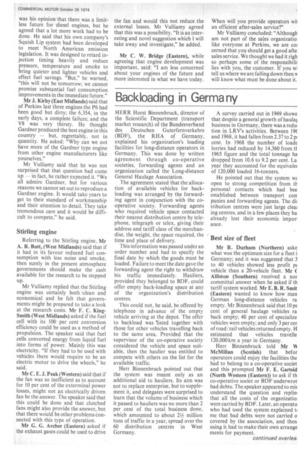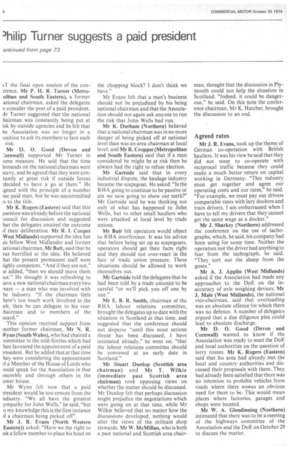Backloading in Germa fly HERR Horst Binnenbruck, director of the
Page 75

Page 76

If you've noticed an error in this article please click here to report it so we can fix it.
Scientific Department (transport market research) of the Bundesverband des Deutschen Guterfernverkehrs (BDF), the RHA of Germany, explained his organization's loading facilities' for long-distance operators in Germany. This was done by written agreement through co-operative societies, forwarding agents and an organization called the Long-distance General Haulage Association.
The agreement stated that the allocation of available vehicles for backloading was arranged by the forwarding agent in conjunction with the cooperative society. Forwarding agents who required vehicle space contacted their nearest distribution centre by telephone, telegraph or telex, giving their address and tariff class of the merchandise, the weight, the space required, the time and place of delivery.
This information was passed under an order number and had to specify the final date by which the goods must be loaded. Failure to meet the date gave the forwarding agent the right to withdraw his traffic immediately. Hauliers, provided they belonged to BDF. could offer empty back-loading space at any of the organization's distribution centres.
This could not, he said, be offered by telephone in advance of the empty vehicle arriving at the depot. The offer to backload was listed together with those for other vehicles travelling back to the same area. Provided that the supervisor of the co-operative society considered the vehicle and space suitable, then the haulier was entitled to compete with others on the list for the available traffic.
Herr Binnenbruck pointed out that the system was meant only as an additional aid to hauliers. Its aim was not to replace enterprise, but to supplement it, and delegates were surprised to learn that the volume of business which it passed to hauliers was no more than 2 per cent of the total business done, which amounted to about 21/2 million tons of traffic in a year, spread over the 60 distribution centres in West Germany. A survey carried out in 1969 showe that despite a general growth of haulal business in Germany, there was a redtt tion in LRV's activities. Between 19( and 1968, it had fallen from 2.37 to 2 pi cent. In 1968 the number of loadt lorries had reduced by 14,360 from ti 1965 figure and the total tonnage ha dropped from 10.6 to 9.2 per cent. La year they accounted for the equivalei of 120,000 loaded 16-tonners.
He pointed out that the system WE open to strong competition from th personal contacts which had bee established between transport con panies and forwarding agents. The di: tribution centres were just large clew ing centres, and in a few places they ha already lost their economic impor ance.
Best size of fleet
Mr R. Durham (Northern) aske what was the optimum size for a fleet i Germany; and it was suggested that 3 to 40 vehicles showed less profit ix vehicle than a 20-vehicle fleet. Mr 4( Alliston (Southern) received a nor committal answer when he asked if th tariff system worked. Mr E. B. R. Smit (Eastern) wanted to know how man German long-distance vehicles ra empty. Mr Binnenbruck said that 10 pt cent of general haulage vehicles ra back empty; 40 per cent of specialize vehicles were empty; and only 3 per cer of road/ rail vehicles returned empty. H estimated that vehicles travelle 120,000 km a year in Germany.
Herr Binnenbruck told Mr IN McMillan (Scotish) that befor operators could enjoy the facilities the had to belong to a co-operative societ and this prompted Mr F. E. Gartsid (North Western (Eastern)) to ask if th co-operative societ or BDF underwrot bad debts,. The speaker appeared to mis understand the question and repliel that all the costs of the organizatioi were carried by BDF. Later, an operato who had Used the system explained ti me that bad debts were not carried o covered by the association, and thos using it had to make their own arrange ments for payment.
continued overlea. the final open session of the con:sence, Mr P. H. R. Turner (MetroAllan and South Eastern), a former ational chairman, asked the delegates D consider the post of a paid president. 4r Turner suggested that the national hairman was constantly being put at isk by outside agencies and he felt that he Association was no longer in a osition to ask its members to face such risk.
Mr D. 0. Good (Devon and :ornwall) supported Mr Turner in ome measure, He said that the time lemands on the national chairman were reavy, and he agreed that they were contantly at great risk if outside forces decided to have a go at them." He [greed with the principle of a number ine paid man, but he was uncommitted Ls to the title.
MT K. Rogers (Eastern) said that this iuestion was already before the national ;ouncil for discussion and suggested hat the delegates awaited the outcome if their deliberation. Mr R. I. Cooper West Midlands) supported the idea but is fellow West Midlander and former rational chairman, Mr Butt, said that he vas horrified at the idea. He believed hat the present permanent staff were lighly competent. "And if they are not," re added, "then we should move them mt." He thought it was refreshing to lave a new national chairman every two rears — a man who was involved with he industry. "If the chairman feels here's too much work involved in the ob. then he can delegate to his viceirairman and to members of the ioard."
This opinion received support from mother former chairman, Mr N. R. 7Vynn (South Wales), who had chaired a !ommittee in the mid-Sixties which had hen favoured the appointment of a paid )resident. But he added that at that time hey were considering the appointment a Member of the House of Lords who :ould speak for the Association in that issembly and through others in the ower house.
Mr Wynn felt now that a paid resident would be too remote from the ndustry. "We all have the greatest ,ympathy for John Wells," he said, "but o my knowledge this is the first instance a chairman being picked off".
Mr J. R. Evans (North Western Eastern)) asked: "Have we the right to isk a fellow member to place his head on the chopping block? I don't think we have."
Mr Evans felt that a man's business should not be prejudiced by his being national chairman and that the Association should not again ask anyone to run the risk that John Wells had run.
Mr K. Durham (Northern) believed that a national chairman was in no more danger of being picked off at national level than was an area chairman at local level; and Mr R. Cropper (Metropolitan and South Eastern) said that if a man considered he might be at risk then he always had the right to refuse election.
Mr Gartside said that in every industrial dispute, the haulage industry became the scapegoat. He asked: "Is the RHA going to continue to be passive or are we now going to show our teeth?" Mr Gartside said he was thinking not only of what has happened to John Wells, but to other small hauliers who were attacked at local level by trade unions.
Mr Butt felt operators would object to RHA interference. It was his advice that before being set up as scapegoats, operators should get their facts right and they should not over-react in the face of trade union pressure. These situations should be allowed to work themselves out.
Mr Gartside told the delegates that he • had been told by a trade unionist to be careful "or we'll pick you off one by one."
Mr E. B. R. Smith, chairman of the RHA labour relations committee, brought the delegates up to date with the situation in Scotland at that time, and suggested that the conference should not disperse "until this most serious threat has been discussed. I have intimated already," he went on, "that the labour relations committee should be convened at an early date in Scotland."
Mr Stuart Dunlop (Scottish area chairman) and Mr T. Wilkie (immediate past Scottish area chairman) took opposing views on whether the matter should be discussed. Mr Dunlop felt that perhaps discussion might prejudice the negotiations which were going on at that time, while Mr Wilkie believed that no matter how the discussions developed, nothing would alter the views of the militant shop stewards. Mr W. McMillan, who is both a past national and Scottish area chair man, thought that the discussion in Plymouth could not help the situation in Scotland. "Indeed, it could be dangerous," he said. On this note the conference chairman, Mr K. Hatcher, brought the discussion to an end.
Agreed rates
Mr J. R. Evans, took up the theme of German co-operation with British hauliers. It was his view he said that they did not want to co-operate with reciprocal traffic because they could make a much better return on capital working in Germany. "This industry must get together and agree our operating costs and our rates," he said. "For example, we must pay out drivers comparable rates with lazy dockers and train drivers. I am embarrassed when I have to tell my drivers that they cannot get the same wage as a docker." Mr J. Sharkey (Northern) addressed the conference on the use of tachographs, which, he said, his company had been using for some time. Neither the operators not the driver had anything to fear from the tachograph, he said. "They sort out the sheep from the goats."
Mr A. J. Applin (West Midlands) asked if the Association had made any approaches to the DoE on the inaccuracy of axle weighing devices. Mr J. Male (West Midlands), the national vice-chairman, said that overloading was an absolute offence for which there was no defence. A number of delegates argued that a due diligence plea could lead to absolute discharge.
Mr D. 0. Good (Devon and Cornwall) wanted to. know if the Association was ready to meet the DoE and local authorities on the question of lorry routes. Mr K. Rogers (Eastern) said that his area had already met the local and country authorities and discussed their proposals with them. They had already been satisfied that there was no intention to prohibit vehicles from roads where there wswas an obvious need for them to be. This would mean places where factories, garages and shops were located.
Mr W. A. Glendinning (Northern) intimated that there was to be a meeting of the highways committee of the Association and the DoE on October 29 to discuss the matter.












































































































































